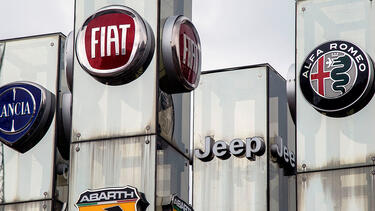With FCA-Renault-Nissan Drama, Who Needs Game of Thrones?
The proposed merger between Renault and Fiat Chrysler would create the world's third-largest automaker and could reshape the future of electric and self-driving cars. But Yale SOM's Jeffrey Sonnenfeld writes that the merger is a fundamentally human drama.

A car dealer in Turin, Italy. Photo: Marco Bertorello/AFP/Getty Images
This article originally appeared in Chief Executive.
For those mourning the finale of HBO’s Game of Thrones, it may be comforting to know that similar leadership intrigue continues—in the auto business. While analysts debate this week’s news over the impending merger of Fiat/Chrysler and Renault in strategic market, financial, and technological terms, those rational deliberations miss the real story.
More than any electric vehicle, AI, or commerce concerns, it was the Japanese government’s suspicious jailing of Renault’s now former CEO Carlos Ghosn and the sudden death of Chrysler CEO Sergio Marchionne—both tough, hard-negotiating leaders—that sparked the timing of this fundamentally human drama, and could create the world’s third-largest carmaker.
Ghosn, as you know, was arrested by Japanese authorities in a move many have branded a conspiracy between the Japanese government and Nissan’s leadership, who chafed over the French company’s 43% ownership of Nissan. Ghosn fueled the once-hemorrhaging Nissan twenty years ago with a needed cash infusion from Renault and tough turnaround tactics. That revived Nissan, which now towers over Renault financially. No shortage of bad blood there.
Marchionne’s sudden death from an undisclosed ailment last summer also caught the industry off guard. He was succeeded by 43-year-old John Elkenn, a grandson of Gianni Agnelli, the swashbuckling patriarch of Fiat who revived the empire he inherited in the 1960s. Fluent in four languages, Elkenn was born in the U.S., educated in the UK for primary school, attended high school in France and engineering in college in Italy. Despite being groomed to ultimately succeed his grandfather, Elkenn, who worked in production and strategy roles at Fiat, has been quietly diversifying the family’s ownership in the Italian carmaker. This deal would reduce the stake from roughly 30% to 15% and make Elkenn non-executive chairman.
Ghosn was replaced at Renault as chairman by the courtly 66-year-old Jean Dominique Senard, the first non-family member to run Michelin, the French tire maker where Ghosn once worked. It is noteworthy that Elkenn traveled to Senard to conduct many of the deal discussions in French. Senard, a long-term political backer of French President Macron, was able to secure French government support for the potential deal—essential since France owns 15% of Renault.
What could go wrong as two ferocious auto titans are replaced by two old-world, congenial, and elegant chiefs prepared to make peace? On paper, the tie-up makes sense. While neither player has a large Chinese foothold, they both have great strengths elsewhere. Fiat/Chrysler brings styling and brands like Jeep, Maseratti, Alfa Romeo, and Ferrari—as well as sizable volume. They also have a solid leader in Chrysler CEO Mike Manley, a strong, low-key operator who quadrupled Jeep’s volume in five years. Renault brings volume, as well as great technologies to transfer to Fiat Chrysler—which has four different platform architectures for Jeep alone.
The disrupter is the surely unhappy Nissan, which wrongly—if the conspiracy thinkers are correct—thought it would get the upper hand on Renault by imprisoning Ghosn. The new Fiat/Chrysler-Renault would retain the 43% ownership of Nissan, but dilute Nissan’s ownership in Renault from 15% down to 7.5%. Nissan can’t be eager to help a formidable competitor by giving permission to share jointly owned IP with Renault over valuable EV and powertrain technologies.
All of which is a great reminder for CEOs that in this world of self-directed work teams, empowered groups, flatter bureaucracies, and the personality-free management techniques we teach in MBA classes, individuals still make a difference, even at this global scale. The timing of personal ambitions, frailties, tenacity, and diplomacy are just as important as technology and tactics in driving industrial transformation. Perhaps even more so. In other words: Game On.